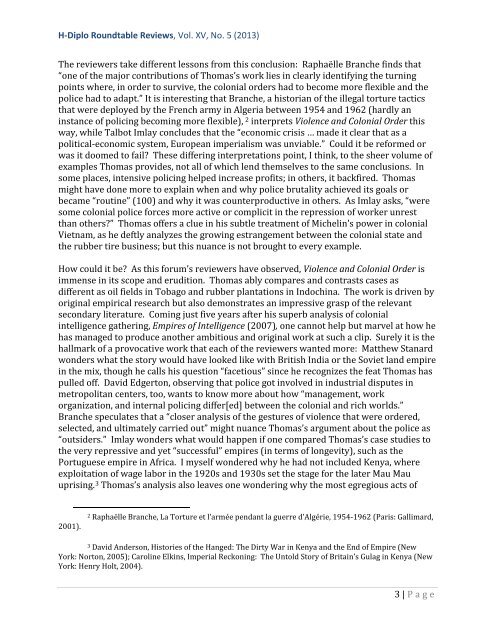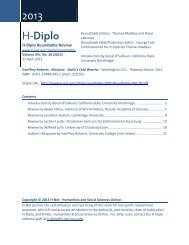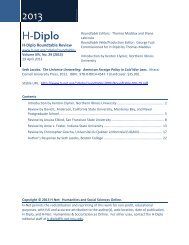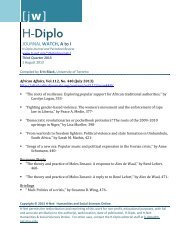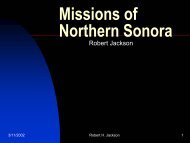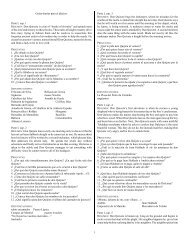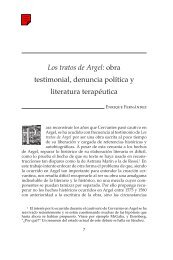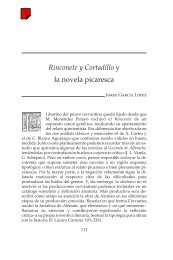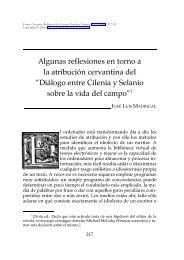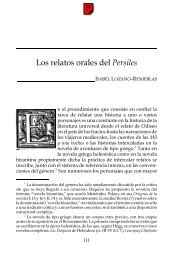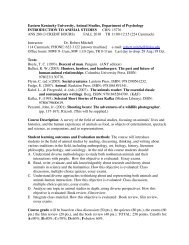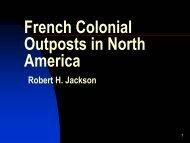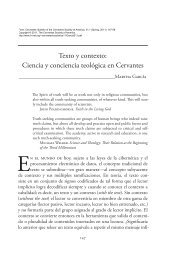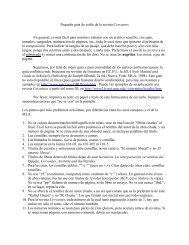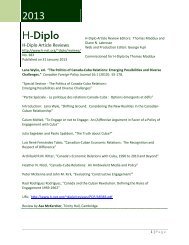H-Diplo Roundtable on Martin Thomas. Violence and ... - H-Net
H-Diplo Roundtable on Martin Thomas. Violence and ... - H-Net
H-Diplo Roundtable on Martin Thomas. Violence and ... - H-Net
You also want an ePaper? Increase the reach of your titles
YUMPU automatically turns print PDFs into web optimized ePapers that Google loves.
H-<str<strong>on</strong>g>Diplo</str<strong>on</strong>g> <str<strong>on</strong>g>Roundtable</str<strong>on</strong>g> Reviews, Vol. XV, No. 5 (2013)<br />
The reviewers take different less<strong>on</strong>s from this c<strong>on</strong>clusi<strong>on</strong>: Raphaëlle Branche finds that<br />
“<strong>on</strong>e of the major c<strong>on</strong>tributi<strong>on</strong>s of <strong>Thomas</strong>’s work lies in clearly identifying the turning<br />
points where, in order to survive, the col<strong>on</strong>ial orders had to become more flexible <strong>and</strong> the<br />
police had to adapt.” It is interesting that Branche, a historian of the illegal torture tactics<br />
that were deployed by the French army in Algeria between 1954 <strong>and</strong> 1962 (hardly an<br />
instance of policing becoming more flexible), 2 interprets <strong>Violence</strong> <strong>and</strong> Col<strong>on</strong>ial Order this<br />
way, while Talbot Imlay c<strong>on</strong>cludes that the “ec<strong>on</strong>omic crisis … made it clear that as a<br />
political-ec<strong>on</strong>omic system, European imperialism was unviable.” Could it be reformed or<br />
was it doomed to fail? These differing interpretati<strong>on</strong>s point, I think, to the sheer volume of<br />
examples <strong>Thomas</strong> provides, not all of which lend themselves to the same c<strong>on</strong>clusi<strong>on</strong>s. In<br />
some places, intensive policing helped increase profits; in others, it backfired. <strong>Thomas</strong><br />
might have d<strong>on</strong>e more to explain when <strong>and</strong> why police brutality achieved its goals or<br />
became “routine” (100) <strong>and</strong> why it was counterproductive in others. As Imlay asks, “were<br />
some col<strong>on</strong>ial police forces more active or complicit in the repressi<strong>on</strong> of worker unrest<br />
than others?” <strong>Thomas</strong> offers a clue in his subtle treatment of Michelin’s power in col<strong>on</strong>ial<br />
Vietnam, as he deftly analyzes the growing estrangement between the col<strong>on</strong>ial state <strong>and</strong><br />
the rubber tire business; but this nuance is not brought to every example.<br />
How could it be? As this forum’s reviewers have observed, <strong>Violence</strong> <strong>and</strong> Col<strong>on</strong>ial Order is<br />
immense in its scope <strong>and</strong> eruditi<strong>on</strong>. <strong>Thomas</strong> ably compares <strong>and</strong> c<strong>on</strong>trasts cases as<br />
different as oil fields in Tobago <strong>and</strong> rubber plantati<strong>on</strong>s in Indochina. The work is driven by<br />
original empirical research but also dem<strong>on</strong>strates an impressive grasp of the relevant<br />
sec<strong>on</strong>dary literature. Coming just five years after his superb analysis of col<strong>on</strong>ial<br />
intelligence gathering, Empires of Intelligence (2007), <strong>on</strong>e cannot help but marvel at how he<br />
has managed to produce another ambitious <strong>and</strong> original work at such a clip. Surely it is the<br />
hallmark of a provocative work that each of the reviewers wanted more: Matthew Stanard<br />
w<strong>on</strong>ders what the story would have looked like with British India or the Soviet l<strong>and</strong> empire<br />
in the mix, though he calls his questi<strong>on</strong> “facetious” since he recognizes the feat <strong>Thomas</strong> has<br />
pulled off. David Edgert<strong>on</strong>, observing that police got involved in industrial disputes in<br />
metropolitan centers, too, wants to know more about how “management, work<br />
organizati<strong>on</strong>, <strong>and</strong> internal policing differ[ed] between the col<strong>on</strong>ial <strong>and</strong> rich worlds.”<br />
Branche speculates that a “closer analysis of the gestures of violence that were ordered,<br />
selected, <strong>and</strong> ultimately carried out” might nuance <strong>Thomas</strong>’s argument about the police as<br />
“outsiders.” Imlay w<strong>on</strong>ders what would happen if <strong>on</strong>e compared <strong>Thomas</strong>’s case studies to<br />
the very repressive <strong>and</strong> yet “successful” empires (in terms of l<strong>on</strong>gevity), such as the<br />
Portuguese empire in Africa. I myself w<strong>on</strong>dered why he had not included Kenya, where<br />
exploitati<strong>on</strong> of wage labor in the 1920s <strong>and</strong> 1930s set the stage for the later Mau Mau<br />
uprising. 3 <strong>Thomas</strong>’s analysis also leaves <strong>on</strong>e w<strong>on</strong>dering why the most egregious acts of<br />
2001).<br />
2 Raphaëlle Branche, La Torture et l’armée pendant la guerre d’Algérie, 1954-1962 (Paris: Gallimard,<br />
3 David Anders<strong>on</strong>, Histories of the Hanged: The Dirty War in Kenya <strong>and</strong> the End of Empire (New<br />
York: Nort<strong>on</strong>, 2005); Caroline Elkins, Imperial Reck<strong>on</strong>ing: The Untold Story of Britain’s Gulag in Kenya (New<br />
York: Henry Holt, 2004).<br />
3 | P age


